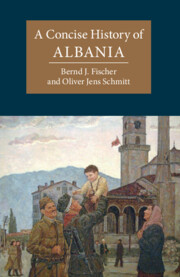Book contents
- A Concise History of Albania
- Cambridge Concise Histories
- A Concise History of Albania
- Copyright page
- Contents
- Illustrations
- Maps
- Preface
- Part I Between Regional Self-Will and Imperial Rule
- 1 The Space and Time of Albanian History
- 2 The Albanians in the Middle Ages, 500–1500
- 3 The Albanians under Ottoman Rule: The Classic Period of Arnavutluk, 1500–1800
- 4 Ottoman Arnavutluk in Crisis, 1800–1912
- Part II State and Nation Construction
- Political Systems and the Principal Political Leadership since Independence in 1912
- Suggestions for Further Reading (literature in non-Balkan languages)
- Index
4 - Ottoman Arnavutluk in Crisis, 1800–1912
from Part I - Between Regional Self-Will and Imperial Rule
Published online by Cambridge University Press: 18 October 2022
- A Concise History of Albania
- Cambridge Concise Histories
- A Concise History of Albania
- Copyright page
- Contents
- Illustrations
- Maps
- Preface
- Part I Between Regional Self-Will and Imperial Rule
- 1 The Space and Time of Albanian History
- 2 The Albanians in the Middle Ages, 500–1500
- 3 The Albanians under Ottoman Rule: The Classic Period of Arnavutluk, 1500–1800
- 4 Ottoman Arnavutluk in Crisis, 1800–1912
- Part II State and Nation Construction
- Political Systems and the Principal Political Leadership since Independence in 1912
- Suggestions for Further Reading (literature in non-Balkan languages)
- Index
Summary
Chapter 4 describes developments in the nineteenth century when the Ottoman empire initiated military and administrative reforms in response to military defeats, particularly against Russia. In the southwestern Balkans, Albanian Sunnis resisted any change in their privileged position vis-à-vis the Christian population. Sunni Albanians were among the conservative and anti-reform forces in the Ottoman empire. When Christian nation-states emerged in the Balkans following the uprisings in Greece and Serbia, major European powers intervened ever more arressively in the Ottoman Balkans. In that context, Christians and Bektashi Muslims began to design an Albanian national program. These national activists struggled to overcome both religious differences and distinct regional special identities. The loss of territory by the Ottomans in the Balkans after the Berlin Congress (1878) also mobilized the Sunnis, who increasingly feared the collapse of the empire. The Albanian Balkan provinces of the Ottoman empire developed into a laboratory for competing identity politics by local actors and the major European powers.
Keywords
- Type
- Chapter
- Information
- A Concise History of Albania , pp. 99 - 142Publisher: Cambridge University PressPrint publication year: 2022

